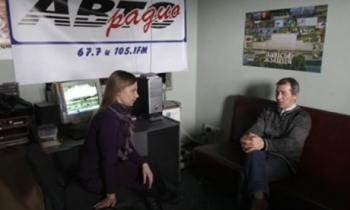The Americans may call them surrender-monkeys, but the French can sometimes teach the world something about pluck -- or maybe foolhardiness. France Soir has just courted big trouble by printing across two pages all 12 of the Danish newspaper cartoons that have caused such a furore in the Muslim world. For good measure, they ran their own cartoon across the front page, featuring not just the Prophet Muhammad but the Jewish and Christian deities and Buddah. "Yes, we have the right to caricature God," said the headline.
Fear of fatwahs or worse had until now caused the rest of the French press to follow the European media in not publishing the offending cartoons of the Prophet. Other papers in Italy, Spain, Germany, the Netherlands and Italy today joined France Soir in publishing some of the cartoons. The French paper claims that it is striking a blow for freedom of expression and against the tyranny that "backward bigots" are inflicting on the world's media.
The newspaper said out loud what many journalists and politicians in France have been voicing privately. France Soir said it was outrageous that Denmark and its media had been forced to apologise for exercising a freedom of expression that is denied to people in most Muslim countries. It urged the media not to "surrender to this new inquisition".
Jean-Francois Copé, the minister who acts as Government spokesman has stood up for France Soir, with a qualification, saying that France is attached to the freedom of expression "in a spirit of tolerance and respect for everyone's beliefs."
The newspaper's action has won some admiration among the rest of the Paris media but everyone knows that it has less to lose than most. The title, which was France's biggest-selling paper in the 1950s and 1960s, has fallen on hard time and is now in the hands of the bankruptcy courts. Oddly, its owner owner is Ramy Lakah, 42, an Egyptian tycoon who recently held a parliamentary seat in Cairo and usually comes with the media tag "controversial". No-one knows whether Lakah, who is trying to sell his majority holding in France Soir, was involved in the cartoon ploy. But apart from the desire to make a splash, France Soir's decision to publish is in keeping with French attitudes to religion and freedom of expression.
The revolution of 1789 separated the state from all religion and a 1905 law reinforced le sécularisme, the doctrine that citizens may not impose their spiritual convictions on others. This lay behind the 2004 law against religious garb in state schools. The law, devised to stop Muslim girls from wearing head-covering in the class-room, remains popular and it produced no direct backlash.
I say 'direct' because some -- mainly people outside France -- would argue that the riots on the housing estates last autumn were the result of the state's "anti-Muslim" policies. Talking to the kids who were on the rampage -- mainly ethnic Arabs and Africans -- it was clear that religion or the headscarf law was not stirring their anger so much as their sense of exclusion from jobs and white French society on racial grounds. No doubt, though, their sense of exclusion is fuelled by the ancestral anti-Muslim prejudices that prevail in France and are not helped by the headscarf ban.
For all France's fierce laws protecting privacy and the media's deference towards the powerful, the country is not squeamish about flouting the political correctness that covers the sensitivity of various "communities". René Pétillon, one of the most popular comic strip artists, has just published a new comedy adventure called L'Affaire du Voile (the Headscarf Case). His hero, a bumbling police inspector called Palmer, makes a fool of himself trying to penetrate France's Muslim world. Pétillon said in an interview today that he was aware of upsetting fundamentalists but he was not worried. "I am not attacking anything in the Koran, just the excesses that are derived from it."
The international media organisation Reporters-sans-Frontières has come out today heavily on the side of Jyllands-Posten, the Danish newspaper that has stirred the wrath of the Middle East. Denmark has nothing to apologise for, said Robert Ménard, the RSF chief. "All European states should be behind the Danes and the Danish Government in defending the principle that a newspaper can print what it wants... even if it causes offence."









